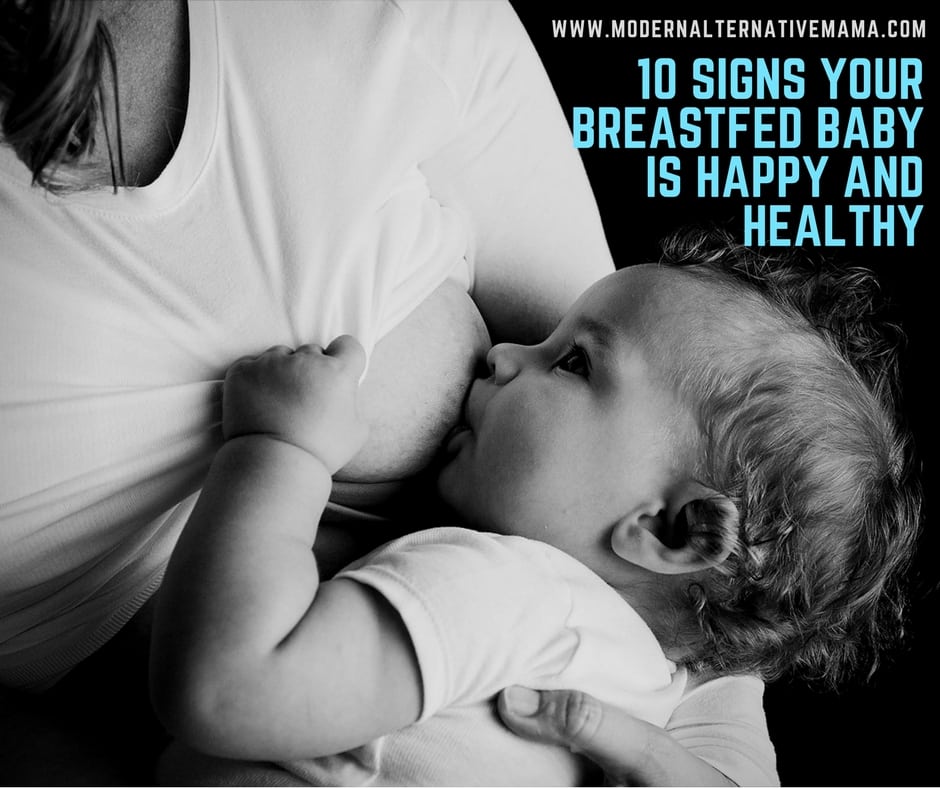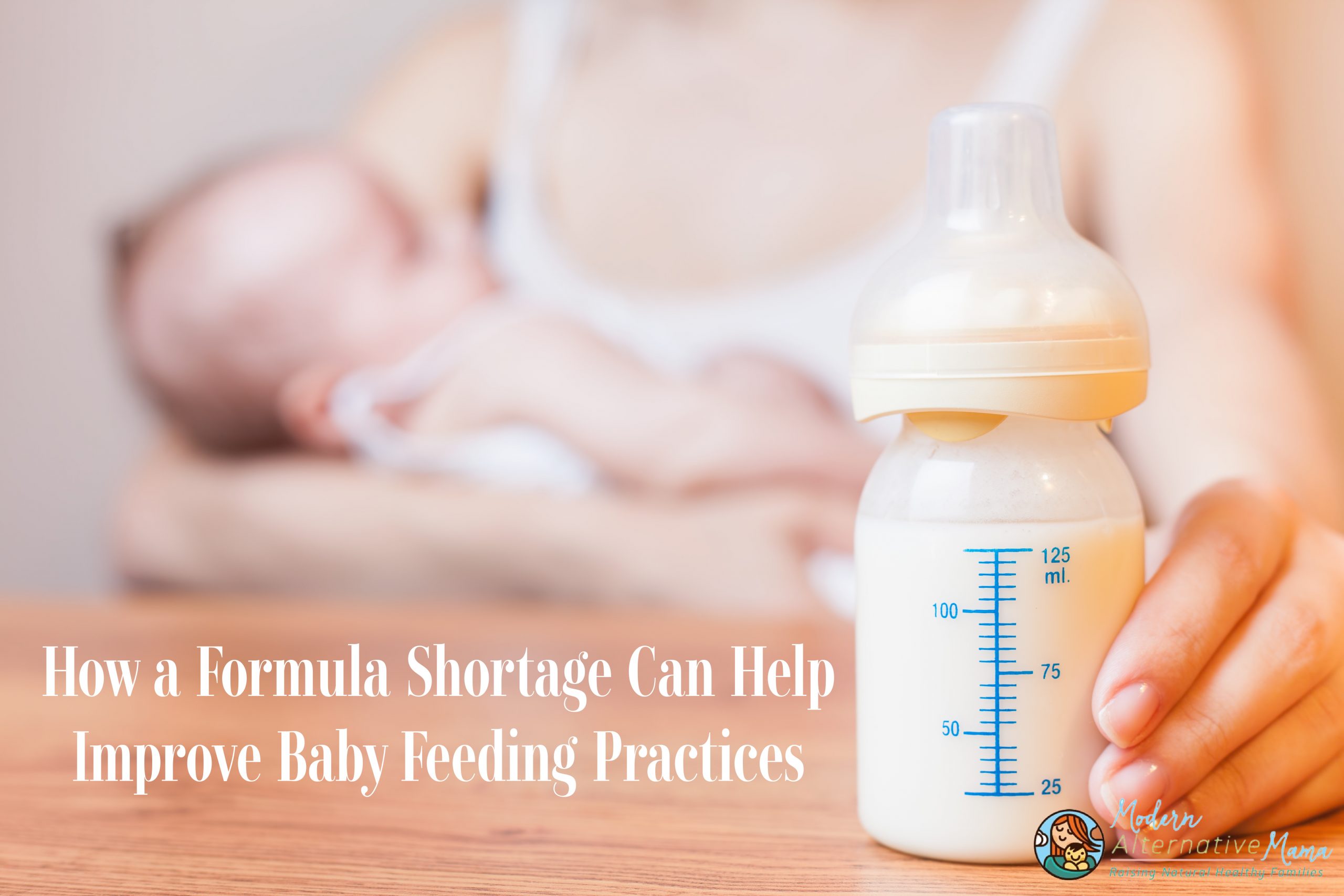I have heard some pretty ridiculous stories in my years as a mom.
One of the most common themes is centered around breastfed babies. That is, that a whole lot of people don’t understand what “normal weight gain” for breastfed babies looks like, and they push supplementing or early solids as a result. In the vast majority of cases, these people should be ignored.
Someone even told me a story of a baby — who was exclusively formula-fed — who was only gaining 2 – 3 oz. per week. Pediatrician told mom baby was “fine.” If she’d been breastfeeding, you know she would have been told that her baby wasn’t gaining enough weight and would have pushed supplementing. However, this was just a slow growing, small baby (this was in line with family history). Too many people still act like formula is the biological norm, and it’s not. It’s good for babies who need it, but it’s not what we should base our charts and decisions on — and we do.
To help combat all of this poor information surrounding breastfeeding, here are 10 signs your breastfed baby is happy and healthy!
10 Signs Your Breastfed Baby is Happy and Healthy
Breastfeeding and formula feeding just aren’t the same. Formula feeding is more based off schedules, and measuring. It’s obvious what baby is taking in and exactly when. Baby has “meals” every 3 – 4 hours from birth, effectively. It sometimes feels easier, because there’s clear evidence if baby is or isn’t getting enough. (Whether the formula is actually the right fit for baby is another story, of course.)
But breastfeeding isn’t like that. Baby may nurse every 10 minutes or every 4 hours (and it’s normal to vary frequency throughout the day), and may take only a little milk or a lot. They eat “on demand” more typically and not on a schedule. It’s very difficult to know how often and how much they’re eating, so there’s no objective way to ensure they are getting enough. This alarms some new mothers, and some well-meaning relatives, friends, and even old-school doctors.
That’s why you need to watch your baby, and look for these 10 signs, instead of listening to the nay-sayers!
1. Regular Peeing
The very first sign you should look for — is your baby having plenty of wet diapers? “Plenty” means the same number as the baby’s age in days, for the first week. (Day 1 = 1 diaper, day 2 = 2 diapers, etc.) After the first week, 6 – 8 fairly wet diapers per day is good. If you are using disposable, squeeze it — it will get thicker and squishy when wet, even though it may not feel wet on the inside. If you are using cloth, feel the insert inside the diaper. After the first week, many newborns actually pee a lot, so it’s typically not hard to tell.
When to worry: If baby isn’t having at least 3 wet diapers in 24 hours for more than a day or two, something may be wrong.
2. Regular Pooping
Pooping is also a good sign that baby is getting enough milk. Most brand-new babies poop with every feeding, or at least 2 – 3 times a day. After a couple weeks, many will go anywhere from several times a day to only once a week. As long as baby doesn’t seem uncomfortable, and the final poop is soft, it’s probably fine. (I’m really not convinced going so long is entirely normal, but the prevailing wisdom is that it is fine still.)
When to worry If it’s been more than a week and this is unusual, or if your baby seems uncomfortable. Pooping really won’t be your first clue that baby isn’t getting enough, but may be a clue to something else health-related. (For example, bright green poo and gas can mean too much foremilk. Mucousy green poo can mean an infection.)
3. Wakeful/Alert Periods
After the first few days of life, your baby should have a distinct wakeful period (or two) each day. These may be short, only 15 – 20 minutes, at first. But your baby should be noticeably alert and interested in looking at you and his/her surroundings. Alert, content babies are well-fed babies.
When to worry: If your baby is still so sleepy that you’re having to wake him/her for feedings past the first few days, or it seems like s/he is lethargic or unable to suck, something is wrong and the baby needs to be seen. It could be something fairly simple, like a tongue or lip tie, making it hard for your baby to suck, tiring him or her out before s/he’s had enough to eat. Or it could be something more serious. Either way, this is a real clue to baby’s health.
4. Steady Weight Gain
This is important, so pay attention.
The average baby gains about 5 – 6 oz. per week in the first few months. Some will gain much more, and some will gain less. A range of anywhere from 1 – 16 oz. per week can be perfectly normal. What really matters is if there’s a general upward trend. A baby who gains nothing for a week or two needs to be watched. A baby who is losing weight (after the first week) is not normal. It is normal for babies to lose up to 15% of their body weight in the first few days after birth — they’re exerting a lot of new energy to maintain their body temperatures, they aren’t eating a whole lot yet (until mom’s mature milk comes in), and many have extra fluids they’re excreting. As long as that trend turns around and they’re back at birth weight by 10 – 14 days of age, they’re fine.
How quickly or slowly your baby gains probably does not matter, if all other signs are positive. Weight gain alone should never be used to determine if baby is getting enough or is healthy.
When to worry: If a baby has not regained birth weight by 2 weeks or age, or if baby starts to lose weight at any point after 5 – 7 days old, it should be checked.
5. Meeting Milestones
Every baby has several awesome milestones to reach as they age. It starts with the first smile, somewhere around 4 – 6 weeks old. After that, rolling over, holding their head steady, “standing” while held, sitting up, and so on. If your baby is meeting these milestones at roughly average ages, and more importantly, is consistently meeting new milestones over time, it’s likely that s/he’s eating enough. A baby that is starving is not going to have the energy to expend on new achievements.
Of course, if your baby is not meeting milestones, and all other signs are good, don’t jump to “he’s not eating enough.” Not meeting milestones can occur for a number of reasons, including a physical disability, chromosomal abnormality, misalignment of the spine, and so on. A professional evaluation could tell you more.
When to worry: If baby’s delayed by at least a month on major milestones (3 – 6 months on later-achieved milestones) and there’s a consistent pattern of delay, an evaluation is a good idea.
6. One “Long” Sleep Stretch
Almost from birth, many babies will sleep one “long” stretch. Now, “long” is very relative when it comes to newborns. This stretch may be 3 – 6 hours, averaging more like 4 for many babies. A typical newborn will nurse every 1 – 3 hours throughout the day, nurse more frequently in the evenings (as often as every 20 – 30 minutes; this is called “cluster feeding”), and then sleep a 3 – 4 hour stretch before beginning to nurse every 2 – 3 hours (or more) again. Some babies have that longer stretch in the morning and nurse frequently through the night. That’s annoying (and tiring) for mom, but not abnormal. As long as there’s one decent sleep stretch, that’s a good sign.
When to worry: If baby’s nursing very frequently around the clock, every hour, and this is constant behavior, baby may not be getting enough. If that happens once in awhile in an otherwise normal pattern, it could mean a growth spurt or illness and isn’t a problem.
7. Seems Satisfied While Nursing
A healthy, happy baby will latch on, nurse, and seem generally content on the breast. Baby may come off and need a burp or want to switch sides while nursing, but typically will nurse quietly until finished. (At least in the early months — no promises once they get older!)
When to worry: If baby is frequently popping on and off while nursing, fussing, arching his/her back, refusing to latch on, something’s wrong. It could be a poor nursing position (try another way); something in mom’s milk could be causing a reaction (try an elimination diet); it could be a growth spurt (babies can get quite irate when they’re extra hungry for a few days and mom’s supply hasn’t caught up yet). If this is an unusual reaction, it’ll most likely straighten out in a day or two. If this is frequent, it needs addressed.
8. Seems Satisfied After Nursing
Most babies, when they are finished nursing, will come off and seem satisfied. They may fall asleep, or they may stay awake, but they shouldn’t be fussy or act like they need to eat again. Some babies will be a little fussy until they burp, and then settle down, which is normal.
When to worry: Baby constantly seems hungry, isn’t settling down after nursing, is fussy. This may not be a sign of hunger, though. Babies also nurse for comfort and not just food, so they may be growing, not feeling well, etc. and just seeking closeness with you. If baby is constantly unsettled, it’s time to figure out what’s going on.
9. “Test Weighing” is Good
If you just can’t shake the feeling that your baby isn’t getting enough, then you can try something called “test weighing.” For this, you need a very precise scale. Weigh the baby (exact number of pounds and ounces), then feed the baby, then weigh the baby again. Do not change baby’s clothing or diaper at all. This will tell you how much baby has eaten — the change in weight is roughly equivalent to what baby has eaten. This is usually not necessary, but can give peace of mind if you are concerned.
When to worry: If more than one test weighing shows that baby is getting a very small amount, and you’re sure the scale is accurate (and there are other signs that baby may not be getting enough), it’s time to look into options.
10. Mama’s Instincts
Bottom line…what are your instincts telling you? Do you feel like baby is happy and healthy, and others are causing you to worry unnecessarily? Or do you honestly think that something is wrong? Your instincts, along with these other signs, will tell you what you need to know.
A Note on Pumps….
Some will try to tell you that a pump will help you determine your supply. That is, if you can pump enough, you’re making enough.
It is true that if you pump a lot, you are clearly making a healthy supply. You wouldn’t be able to pump it if you didn’t have it! However, the reverse is NOT true. If you cannot pump very much, that may just mean you don’t respond well to a pump. It does not mean that you don’t actually make enough. Never let someone tell you that because you can’t pump that you don’t produce!
If you are struggling with a lip or tongue tie, or baby is not latching well for another reason, a pump can help to boost your supply (even if you don’t get much out) while you work with a lactation consultant to address the issue(s). If you are able to pump some milk, you can offer this milk to baby via bottle or SNS (Supplemental Nursing System; it’s a tiny tube that attaches to your nipple so baby gets milk through it while nursing). Keep trying to nurse, and please do see a lactation consultant for help!
If You Suspect a Problem….
If you honestly think baby isn’t getting enough, then obviously you need to address this. We don’t want babies starving. However, formula or early solids are not your first options!
Instead, try:
- See a lactation consultant to troubleshoot positioning/latch
- Take a “nursing vacation” and stay in bed with your baby and nurse, nurse, nurse!
- Eat and drink more food yourself — you need it, to produce milk!
- Try to pump to help boost supply, and offer baby the pumped milk via cup, syringe, or SNS (bottle if needed, but better not to if baby isn’t latching well)
- Ask a trusted friend for donor milk to feed baby while trying some of the things above, too
- Purchase organic formula (Baby’s Only or Holle) to feed baby
Do not offer solid foods to babies under 4 months, and preferably not under 6 months. They do not need “a little cereal before bed so they’ll sleep longer.” This can damage their fragile, immature guts. Formula will be perfectly fine if they honestly need a supplement. There is never a baby so big that they truly “need” more than breastmilk or formula in the first few months of life.
Trust Yourself
Ignore the people who, though well-meaning, tell you “That baby looks hungry, you should supplement!” or “That baby is so little! Feed formula so he’ll be fatter!” If your baby is growing well and getting enough milk, it is not healthier to force weight gain. There are babies who are naturally very chubby while exclusively breastfed and they are meant to be. But there are babies who are naturally thinner, too, and they don’t need to have formula to ‘fatten them up,’ any more than you’d give a healthy older kid ice cream every day to ‘fatten them up.’ Nobody thinks the latter is a good idea, so don’t listen to the former, either!
You’ve got this, mama. You’ll raise a healthy, happy baby, one way or another!








Thank Heaven for this! Some articles have me worried about the amount of milk I am providing even. I feel like my baby is very happy and is gaining weight, but like all mom’s worry. Thank you for your help in restoring my confidence in my breastfeeding ability.
❤❤❤❤❤
Awesome post really needed to restore my confidence in breast feeding my twins!! Thank you
Thankyou for clearing my doubts and boosting up my confidence level.
my child was born 2 days ago, but doesn’t pee as yet, he is not sick, he is pooping, but not peeing, or maybe some but i could not tell, I am worried, any advice? my child is a boy
My baby is 1 month old..he pees a lot and he want meh to feed every tym..does it mean he is nt having enough milk??when ever I feed him he wil fall asleep..and he wakes up seems hungry..how do I know he is feri g enough milk
My baby is 1 month old..he pees a lot and he want meh to feed every tym..does it mean he is nt having enough milk??when ever I feed him he wil fall asleep..and he wakes up seems hungry..how do I know he is getting enough milk
One of the best ways to know if you baby is eating enough is by monitoring dirty diapers. After the first week, 6 – 8 fairly wet diapers per day is good. Baby may also be going through a growth spurt where he needs to nurse more often. Here is some additional info on breastfeeding newborns: https://modernalternativemama.com/2018/01/12/no-one-tells-breastfeeding-newborn/